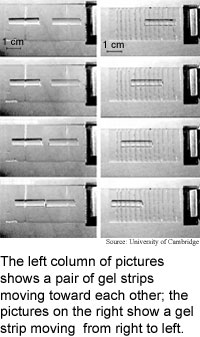
Gel gains life-like motion
By
Kimberly Patch,
Technology Research NewsResearchers from the University of Cambridge in England and Lehigh University have shown that it is possible to make a strip of hydrogel mimic the movements of a snail, inchworm and snake.
The ability could lead to new motion techniques for tiny machines, including robots, and for manufacturing processes that involve moving substances across surfaces.
The research also shows that there is an underlying unity in the various forms of movement produced by legless animals.
The researchers' first theorized that the creep of a snail, crawl of an inchworm, and back-and-forth motion of the snake could all be described by one coherent theory. They then found a way to prove it. "After the conceptual breakthrough, the main challenge was thinking of the simplest experimental setup to realize it," said Lakshminarayanan Mahadevan, who is now a professor of applied mathematics and mechanics at Harvard University.
The researchers tested the theory by cutting scales into the bottoms of 2-centimeter-long strips of acrylamide hydrogel and placing them on a vibrating table. They were able to cause the strips to mimic the three types of legless locomotion by varying the angle of the scales and the direction of vibration. The experiment shows that "a simple idea can explain the various regimes of locomotion," said Mahadevan.
Most work on microelectromechanical devices that has to do with moving objects around has focused on microfluidics -- controlling small quantities of fluid, said Mahadevan. The hydrogel work shows that soft solids can be moved around relatively easily using a fairly simple process, he said.
The remaining challenge is to find a way to provide the vibrations internally, said Mahadevan. "This can probably be done with a simple onboard engine such as a mechanical-active gel that responds to external actuation [from] electromagnetic or chemical fields" or temperature, he said.
Putting the power on-board would allow for a feedback loop that allows the engine to respond to the way the gel deforms, or bends, according to Mahadevan. Feedback like this allows organisms to respond to external stimuli by changing gaits.
The researchers are working toward a more quantitative understanding of the mechanisms involved in the gel movement in order to figure out how to optimize the motions, said Mahadevan.
The next step is to understand optimal gaits and the transitions between them, and to explore additional gaits like side-winding, slide-pushing and concertina motion, according to Mahadevan. Sidewinder snakes twist and turn to move. "Concertina motion is when the snake literally squeezes itself into the shape of a concertina while pushing against the side of a tube and then alternately drags itself or pushes forward," he said.
The gel devices could be used in practical applications in the next couple of years, said Mahadevan. They could be used in microelectromechanical systems, and robots that inspect crevices and other hard-to-get-to places, he said.
Mahadevan's research colleagues were Manoj Chaudhury and Susan Daniel. The work appeared in the December 15, 2003 issue of Proceedings of the National Academy Of Sciences. The research was funded by the Office of Naval Research (ONR).
Timeline: 2 years
Funding: Government
TRN Categories: Materials Science and Engineering; MicroElectroMechanical Systems (MEMS)
Story Type: News
Related Elements: Technical paper, "Biomimetic Ratcheting Motion of a Soft, Slender, Sessile Gel," Proceedings of the National Academy Of Sciences, December 15, 2003
Advertisements:
December 31, 2003/January 7, 2004
Page One
Bots, humans play together
Light frozen in place
Gel gains life-like motion
Tool eases Grid monitoring
Briefs:
Biochip holds millions of vessels
Inside-out images secure screens
Colors expand neural net
Micro fuel cell runs cool
Electroplating boosts solar cells
Shape key to strong sensors

News:
Research News Roundup
Research Watch blog
Features:
View from the High Ground Q&A
How It Works
RSS Feeds:
News
Ad links:
Buy an ad link
| Advertisements:
|
 |
Ad links: Clear History
Buy an ad link
|
TRN
Newswire and Headline Feeds for Web sites
|
© Copyright Technology Research News, LLC 2000-2006. All rights reserved.